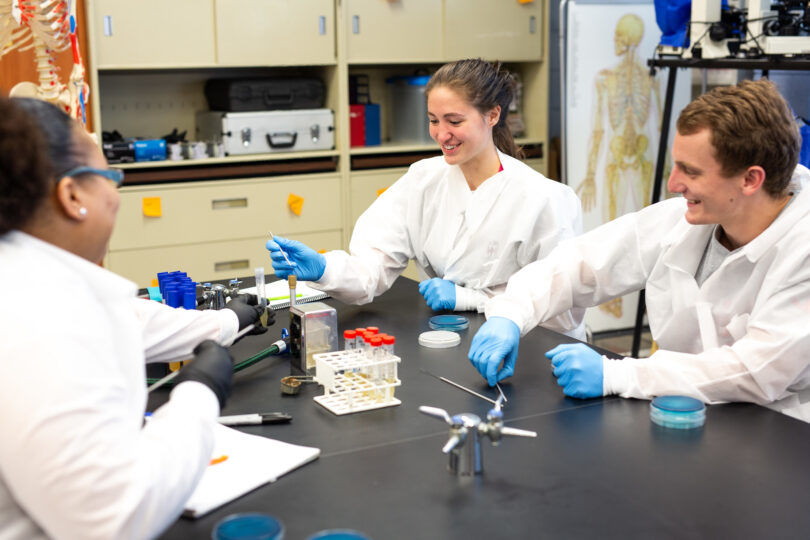The Chemistry department offers major and minor degrees to provide quality academic experiences through intensive classroom instruction integrated with hands-on activities during laboratory sessions.
Chemistry courses are offered to serve the needs of students in major and minor fields as well as students in allied health professional majors and non-science majors fulfilling general education and degree requirements. Majors will be prepared to face regional and national competition for employment and academic placement. In accord with the general mission of the University, courses are taught from a perspective of objective analysis while discriminating between observation and derived theories. It is intended that the student will see that a truly objective observation of the science demonstrates the glory of Christ through His creation.
Students who desire certification to teach advanced biology or chemistry in the secondary school are required by the Missouri Department of Elementary and Secondary Education to complete a Unified Science Core of at least 39 hours with an additional 20 hours minimum in at least one endorsement area (Biology or Chemistry). The program requires specific courses (see the Unified Science major in the Division of Education).
Many developments in modern biological sciences rely extensively on techniques and principles of chemistry and physics. The importance of this relationship has led to the design of the Biochemistry major, which prepares students for advanced study in biochemistry, medicinal chemistry, molecular biology, molecular genetics, structural biology, genetic engineering, and cell biology through the understanding of the fundamentals of chemistry, biology, physics, and mathematics. It provides the basic science background necessary for applying to health professional schools including medical, dental, veterinary, and pharmacy schools. Majors in the field are employed by pharmaceutical, biotech, and medical industries to develop new medicines and research the causes of disease. Biochemists also work in agriculture, developing pest-resistant crops and other technologies, as well as in government labs and educational institutions.
Possible Careers
A degree in chemistry, chemical engineering or related majors can provide opportunities for many exciting careers. In addition, a chemistry degree can be used as a pre-medical option and can lead to an additional professional degree.
Biochemistry
- Biochemistry
- Biotechnology
- Agricultural Chemistry
- Environmental Chemistry
- Food and Flavor Chemistry
- Medicinal Chemistry
- Organic Chemistry
- Water Chemistry
Education
- Chemical Education
- Chemical Information Specialists
- Science Writing
Sales
- Chemical Sales
- Chemical Technology
- Consulting
- R&D Management
- Materials Science
Environmental Chemistry
- Environmental Chemistry
- Organic Chemistry
- Oil and Petroleum
- Water Chemistry
- Geochemistry
- Hazardous Waste Management
Research Chemistry
- Analytical Chemistry
- Consulting
- Colloid and Surface Chemistry
- Consumer Product Chemistry
- Environmental Chemistry
- Materials Science
- Organic Chemistry
- Oil and Petroleum
- Physical Chemistry
- Pulp and Paper Chemistry
- Textile Chemistry
- Water Chemistry
Industrial Chemistry
- Catalysis
- Chemical Engineering
- Consulting
- Consumer Product Chemistry
- Hazardous Waste Management
- Inorganic Chemistry
- Materials Science
- Organic Chemistry
- Oil and Petroleum
- Physical Chemistry
- Polymer Chemistry
- Pulp and Paper Chemistry
- R&D Management
- Textile Chemistry
- Water Chemistry
Forensic Chemistry
- Forensic Chemistry
- Pulp and Paper Chemistry
Research Opportunities
The St. Louis area offers a wide variety of opportunities for research and industry experience. Research internships are desirable on resumes, and companies often offer jobs to their best interns upon their graduation. Many industries located in the area offer internships and use chemists in their research, development and production.
Internship Opportunities
- Barnes Jewish Hospital-St Louis, MO
- Bayer USA- Kansas City
- Lab Support Genesis Program-Kansas City
- Monsanto-Saint Louis
REU Programs
The National Science Foundation has created a program known as REU, or Research Experiences for Undergraduates. In this program, undergraduate students are given the opportunity to experience computational and experimental chemistry hands-on through research projects and lecture series. This program is hosted by a number of universities around the country and is carried out as a summer program where students stay in the school’s accommodations and use the university’s equipment in their research. In addition to providing an opportunity for students to experience unique research, the program hosts world-renowned leaders both from industry and academia in the fields of chemistry and biochemistry. Click here for a list of all the current sites for this year’s program, or visit the links below.
- Duquesne University
- Georgia Technical Institute
- Oklahoma State University – Research Experience in Integrated Nanoscience
- Southern Illinois University Carbondale
- University of Arkansas
- University of Iowa
- University of Kansas
- University of Southern Mississippi- Developing Undergraduate Researchers in Chemistry and Biochemistry
- University of Southern Misissippi- NSF REU Site for Sustainable Aerospace and Marine Polymer Composites
- Vanderbilt University
Chemistry Minor Requirements
CHEMISTRY MINOR
At least 18 hours of Chemistry beyond CHEM 143 and 142.
NOTE: CHEM 143+142, MATH 264, and PHYS 223+221, or their equivalents, are prerequisites for some of the above courses; check the individual course description for details.
Chemistry Bachelor’s Requirements
B.A. in CHEMISTRY
This degree is available for those interested in pre-medicine. The student must complete 30 hours of Chemistry beyond CHEM 143 and 142.
B.S. in CHEMISTRY
This degree is recommended for students planning to enter graduate school or professional employment in chemistry, as well as for students seeking Missouri state teacher certification in Unified Science with an endorsement in Chemistry. The student must complete at least 30 hours of Chemistry beyond CHEM 143 and 142.
NOTE: CHEM 143+142, MATH 264, and PHYS 223+221, or their equivalents, are prerequisites for some of the above courses; check the individual course description for details.
Degree Sheets
Sample Four-Year Plan
View a sample four-year plan for BA Chemistry.
View a sample four-year plan for BS Chemistry.


